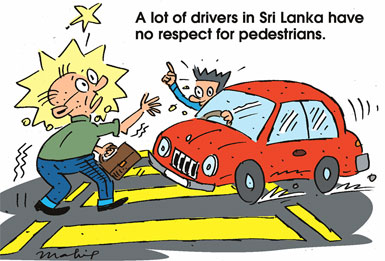|
 by R. S. Karunaratne by R. S. Karunaratne
Subject - verbs agreement
As a rule, the verb should agree with the subject. A singular subject
is followed by a singular verb and a plural subject is followed by a
plural verb.
We use a singular verb with the phrase ‘the number of’. However, we
use a plural verb with the phrase ‘a number of.’
The number of students has increased this year.
The number of books written on literature is enormous.
The number of vehicles on the road on Sunday is relatively small.
The number of applicants for teaching posts has doubled.
The number of hotels on the coastline is insufficient to accommodate
tourists.
A number of’ is followed by a plural verb.

A number of suspects have been arrested.
A number of workers are taking part in the strike.
A number of trees have been felled to put up a tourist hotel.
A number of doctors have protested against their transfers.
A number of tourists were filming the Kandy perahera.
We use singular verbs with the words ‘a lot of, all, all of, most of,
some’ and ‘some of’ when they are used with uncountable nouns.
A lot of sugar was used to make the cake.
All the money was spent on medicine.
We use plural verbs with the above words when they are used with
plural countable nouns.
Most of my friends are not interested in grammar.
A lot of drivers in Sri Lanka have no respect for pedestrians.
Indefinite pronouns
Indefinite pronouns refer to people or things. They are: anybody,
anyone, anything, everybody, everyone, everything, nobody, no one,
nothing, somebody, someone, something.
We use singular verbs with indefinite pronouns.
Anyone’ is used in questions and negatives.
I haven’t spoken to anyone about my transfer.
Is there anyone known to you here?
Has anyone seen my dictionary anywhere?
Anyone can attend my birthday party. I haven’t invited anyone.
’Anything’ refers to any event, act or object.
Is there anything I can do for you?
I don’t know anything about computers.

Is there anything else you wish to buy?
He could be anything (= any age) between 60 and 70.
’Everyone’ or ‘everybody’ means ‘every person.’
Everyone has their views on politics.
Should everybody learn driving?
Goodbye everybody - I’ll see you next Sunday.
’Everything’ means ‘all things.’
Money isn’t everything.
My children are everything to me.
I’ do everything possible to pass the examination.
’Nobody’ means ‘not anyone.’
Is there nobody here who can give me Rs 1,000?
I saw nobody in the classroom.
’Nobody’ also means ‘somebody who is not important.’
He is just some nobody who tries to impress others.
’Nothing’ means ‘not anything.’
There is nothing in cupboard.
I have nothing more to tell you.
There is nothing much to do here.
[Activity]
Underline the correct words in brackets. Check your answers with the
key.
1.(Everything / Everybody) was busy at the bank, so I had to wait for
a long time.
2. (A lot of / A number of) rain has fallen.
3. (Everything / Nothing) in my village has changed over the years.
4. (A number of / Number of) houses have their own security guards.
5. (Somebody / Nobody) knocked against my car and sped away.
6. (The number of / A number of) students is relatively small today.
7. Has (anyone / no one) taken my dictionary?
8. (Something / Someone) about this house reminds me of my childhood.
9. (Nothing / Something) will disturb you here.
10. You can say (anything / anyone) but I’m not angry with you.
Key:
1. Everybody 2. A lot of 3. Everything 4. A number of 5. Somebody 6.
The number of 7. anyone 8. Something 9. Nothing 10. anything
Match the synonyms
A synonym is a word or phrase which has the same or nearly the same
meaning.
Match the words in column ‘A’ with their synonyms in column ‘B’.
Check your answers with the key.
Column A Column B
1. Agile A. acrobatic
2. Agitate B. accept
3. Agony C. association
4. Agree D. distress
5. Aid E. ease
6. Aim F. foreigner
7. Air G. appeal
8. Alarm H. distant
9. Alert I. adapt
10. Alien J. animate
11. Alike K. accomplice
12. Alive L. loyalty
13. Allegiance M. mention
14. Alleviate N. nearly
15. Alliance O. attentive
16. Allow P. permit
17. Allude Q. solo
18. Allure R. assistance
19. Ally S. similar
20. Almost T. trouble
21. Alone U. constantly
22. aloof V. atmosphere
23. Alter W. warning
24. Always X. ambition
25. Amalgamate Y. blend
Key:
1. A
2. T
3. D
4. B
5. R
6. X
7. V
8. W
9. O
10. F
11. S
12. J
13. L
14. E
15. C
16. P
17. M
18. G
19. K
20. N
21. Q
22. H
23. I
24. U
25. Y
Starters:
How to use prepositions
[Part 23]
There are over 100 prepositions in English. This is a very small
number compared with the vast number of nouns, verbs and adjectives we
use. However, most beginners find it difficult to use prepositions
correctly. This is a guide for them.
Together with:
We use ‘together with’ to indicate that another person or thing is
introduced. It also means ‘in addition to.’
I’ll pay the house rent together with water and electricity bills.

Towards:
’Towards’ means ‘in the direction of.’ In American English ‘toward’
is used.
The child got up and walked towards his mother.
She kept glancing towards the clock during the lecture.
Sri Lanka is drifting towards prosperity.
He gestured towards the manager to complain about the food.
We use ‘towards’ to mean ‘in relation to somebody or something.’
I didn’t like my new job because nobody in office was friendly
towards me.
Most newspapers are biased towards a particular political party.
If there is shift towards something, it is popular.
There is a shift towards smaller families.
The new government is moving towards a market economy.
’Towards’ can be used to mean ‘near to.’
Children often get hungry towards the middle of the morning.
We can do something towards the achievement of a result.
Very little has been done towards the promotion of pottery.
We can have a particular attitude towards somebody or something.
He has a friendly attitude towards everybody.
When you contribute towards a worthy cause such as charity, you give
some money.
The businessman made a generous contribution toward the flood victims.
Under:
If something is under something else, it is directly below it.
There is a bundle of books under the table.
The thief hid under the bed.
The nurse put the thermometer under the patient’s tongue.
What are you carrying under your arm?
Let’s wait under the tree till rain ceases.
Certain things can be found or done under the earth or water.
How long can you wait under water?
Many treasures can be found under the earth.
We can use ‘under’ to say that somebody or something is affected by
something.
”Everything is under control,” the police said.
You’re under arrest!
Some of the undergraduates are under investigation.
If you work under somebody, he is your boss.
Lionel worked as a typist under a lawyer.
[Activity]
Fill in the blanks with suitable prepositions. Check your answers
with the key.
1. When it gets warmer the snow will start ......... melt.
2. There is somebody ........... the hall door.
3. Did you have to pay customs duty ........... that?
4. What does he do ........... the evenings?
5. I am fed up .......... this wet weather.
6. He hung .......... the entrance all day.
7. Peter sent his son ............ the garden so as to have some peace.
8. That last conversation we had is engraved ............ my memory
forever.
9. Mispronunciation can be a serious obstacle .......... making yourself
understood in a foreign language.
10. A new baby will automatically curl its fingers ............ any
object it touches.
Key:
1. to 2. at 3. on 4. in 5. with 6. about 7. into 8. on 9. to 10.
round
Form adjectives from nouns
Words often come in families. You can expand your vocabulary by
becoming familiar with these word families. In the following quiz we
give you 25 nouns in column ‘A’. Write the relevant adjectives in column
‘B’ and check your answers with the key.
Column A Column B
1. Sadness ..............
2. Safety ..............
3. Satisfaction ..............
4. Scare ..............
5. Scholar ..............
6. Science ..............
7. Score ..............
8. Search ..............
9. Seat ..............
10. Secrecy ..............
11. Sense ..............
12. Separation ..............
13. Seriousness ..............
14. Service ..............
15. Shadow ..............
16. Shape ..............
17. Sharpness ..............
18. Shine ..............
19. Shock ..............
20. Shortage ..............
21. Shyness ..............
22. Sickness ..............
23. Sight ..............
24. Signature ..............
25. Significance ..............
Key:
1. sad
2. safe
3. satisfactory
4. scared
5. scholastic
6. scientific
7. scoreless
8. search
9. seated
10. secret
11. sensible
12. separate
13. serious
14. serviceable
15. shadowy
16. shapeless
17. sharp
18. shiny
19. shocking
20. short
21. shy
22. sickly
23. sighted
24. signed
25. significant |


